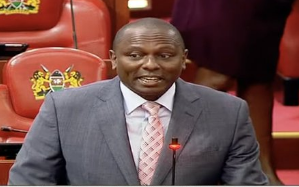

Legislators have described the death of author, playwright, and post-colonial theorist Ngugi wa Thiong’o as the end of an era in the African literary community and beyond.
Ngũgĩ wa Thiong’o, who passed away on May 28, 2025, at the age of 87, playwright will resonate for generations to come.
With each play, each book, he captured the hearts and minds of audiences, transporting them to different worlds and teaching them valuable lessons about life.
He was recognised globally for his powerful political voice and literary innovations.
Ngũgĩ dedicated his life to championing African languages, culture, and liberation through his extensive works.
On Tuesday, Members of Parliament paid tribute to Ngugi wa Thiong’o, eulogising him as an epitome of philosophy.
Seme MP James Nyikal said Ngugi’s life epitomises the philosophical basis of life, the idealism that is associated with scholarship, the ability to strive and go against all odds to fight for ideals.
“This is what distinguishes human beings from animals; animals do not fight for ideals. Human beings fight for ideals, and sometimes they suffer like he suffered. They have to make sometimes very grave decisions at great risk to their lives because there is something they stand for, something they believe will make a difference in society,” MP Nyikal said.
Rarieda MP Otiende Amollo said Ngugi wa Thiong'o shaped the literary thinking of virtually every person living right now.
Amollo eulogised him, saying the government should name something in honour of Ngugi and the legacy he has left behind.
He said many people have become what they are because they started reading Ngugi in primary school.
“Ngugi, unfortunately, remains one of those whose intellect may not have been shared in his later life because of political intolerance, and there's a long list of his contemporaries who had to flee the country at the time,” he said.
According to him, it is a lesson that people must have some level of tolerance, even of those with whom they do not agree.
He said that, even though Ngugi may not have won the Nobel Peace Prize, he remains a towering giant in East Africa, Africa and the world like no other.
Suba North MP Millie Odhiambo singled out how Ngugi dealt with the issue of feminism.
Millie said that the majority of the characters in the River Between are women whom he exalted, and he showed them as fighting tyranny and exploitation.
“He sees women as victims of African society and the patriarchal system. And to liberate themselves, they endeavoured to shatter the patriarchal obstacles and bring about change. I would want to say that he was way ahead of time,” Millie said.
She said those are some of the issues that people are now talking about, for instance, intersectionality, but he has already dealt with issues that converge and bring women down.
“Like the intersectionality of gender, race and even ethnicity.”
Majority Leader Kimani Ichung’wah said Ngugi contributed immensely not just to the growth of literature but also to the growth of African languages.
He said that Ngugi wa Thiong'o dropped the name James for Ngugi wa Thiong'o and also began to write in Gikuyu.
This, he said, was not because he was a tribalist, but because he was a nationalist.
“When he was imprisoned here by the past regimes in the 70s, he was imprisoned with many other political prisoners who were not of Kikuyu descent, and he lived on to fight for justice, equality in Kenya, irrespective of where you came from,” he said.
“Even his associations in the literary world speak volumes about the man that Ngugi was. He valued his ancestry, he valued his background as a Kikuyu from Limuru, but he never allowed that to be anything to use to lord over others or even to believe that there was one community that was greater than the others.”













